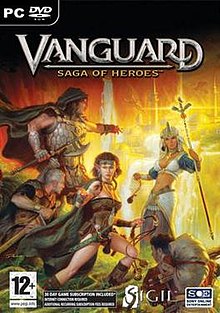
EverQuest is a 3D fantasy-themed massively multiplayer online role-playing game (MMORPG) originally developed by Verant Interactive and 989 Studios for Windows PCs. It was released by Sony Online Entertainment in March 1999 in North America, and by Ubisoft in Europe in April 2000. A dedicated version for Mac OS X was released in June 2003, which operated for ten years before being shut down in November 2013. In June 2000, Verant Interactive was absorbed into Sony Online Entertainment, who took over full development and publishing duties of the title. Later, in February 2015, SOE's parent corporation, Sony Computer Entertainment, sold the studio to investment company Columbus Nova and it was rebranded as Daybreak Game Company, which continues to develop and publish EverQuest.
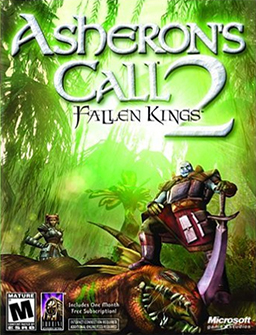
Asheron's Call 2: Fallen Kings was a fantasy massively multiplayer online role-playing game (MMORPG) for Microsoft Windows which was released on November 22, 2002 and shut down on December 30, 2005 before it was relaunched as a beta for active Asheron's Call subscribers in 2012. It is a sequel to 1999's Asheron's Call, although content, graphics and gameplay dynamics differed greatly from its predecessor.

Star Wars Galaxies was a Star Wars- themed massively multiplayer online role-playing game (MMORPG) for Microsoft Windows, developed by Sony Online Entertainment and published by LucasArts.

World of Warcraft (WoW) is a massively multiplayer online role-playing game (MMORPG) released in 2004 by Blizzard Entertainment. Set in the Warcraft fantasy universe, World of Warcraft takes place within the world of Azeroth, approximately four years after the events of the previous game in the series, Warcraft III: The Frozen Throne. The game was announced in 2001, and was released for the 10th anniversary of the Warcraft franchise on November 23, 2004. Since launch, World of Warcraft has had nine major expansion packs: The Burning Crusade (2007), Wrath of the Lich King (2008), Cataclysm (2010), Mists of Pandaria (2012), Warlords of Draenor (2014), Legion (2016), Battle for Azeroth (2018), Shadowlands (2020), and Dragonflight (2022). Three further expansions, The War Within, Midnight, and The Last Titan, were announced in 2023.
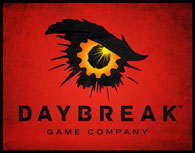
Daybreak Game Company LLC is an American video game developer based in San Diego. The company was founded in December 1997 as Sony Online Entertainment, a subsidiary of Sony Computer Entertainment, but was spun off to an independent investor in February 2015 and renamed Daybreak Game Company. On December 1, 2020, Daybreak Game Company entered into an agreement to be acquired by Enad Global 7.
Player versus player (PVP) is a type of multiplayer interactive conflict within a game between human players. This is often compared to player versus environment (PvE), in which the game itself controls its players' opponents. The terms are most often used in games where both activities exist, particularly MMORPGs, MUDs, and other role-playing video games, to distinguish between gamemodes. PvP can be broadly used to describe any game, or aspect of a game, where players compete against each other. PvP is often controversial when used in role-playing games. In most cases, there are vast differences in abilities between players. PvP can even encourage experienced players to immediately attack and kill inexperienced players. PvP is often referred to as player killing in the cases of games which contain, but do not focus on, such interaction.

Brad McQuaid was an American video game designer who was the key designer of EverQuest, a highly successful massively multiplayer online role-playing game (MMORPG) released in 1999. He later co-founded Sigil Games Online where he served as CEO and Executive Producer of Vanguard: Saga of Heroes until Sony Online Entertainment's acquisition of Sigil Games Online in May 2007. On July 6, 2012, SOE announced the re-hiring of McQuaid to continue his work on Vanguard. On January 13, 2014, McQuaid announced his role of Chief Creative Officer at Visionary Realms, Inc. for the PC MMORPG, Pantheon: Rise of the Fallen.

Warhammer Online: Age of Reckoning was a massively multiplayer online role-playing game based on Games Workshop's Warhammer Fantasy setting, developed by Mythic Entertainment and published by Electronic Arts in 2008. The game revolved around the continual worldwide conflict that the Warhammer Fantasy setting is known for, and the game is geared toward ongoing, constant war laced with dark humour. Age of Reckoning ended up selling over a million copies and peaking at 800,000 subscribers, but dropped to 300,000 subscribers several months later. The game received generally positive reviews from critics but shut down in 2013. Since at least 2014, an active private server called Return of Reckoning has been run by fans, and it remains active as of March 2024.
Sigil Games Online, Inc. was a computer game developer based in Carlsbad, California founded in January 2002 by Brad McQuaid and Jeff Butler, key development team members who created EverQuest, the most popular massively multiplayer online role-playing game before World of Warcraft. McQuaid and Butler left Sony Online Entertainment (SOE), the publisher of EverQuest, and formed Sigil Games Online to develop "the next big thing". McQuaid told to the video game website IGN at the time that he was happy to assemble a team of MMORPG developers and to focus on making similar project, as opposed to his work in SOE. Sigil released their only game Vanguard: Saga of Heroes on January 30, 2007 after several well publicized delays and a last minute switch from publishing with Microsoft to publishing again with SOE. In May 2007, SOE acquired key assets of Sigil Games Online. As a result, SOE now owns Vanguard: Saga of Heroes, described as Sigil's "tent pole property".
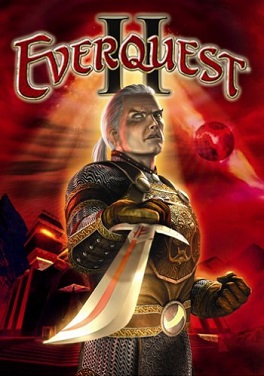
EverQuest II is a 3D fantasy massively multiplayer online role-playing game (MMORPG) originally developed and published by Sony Online Entertainment for Microsoft Windows PCs and released in November 2004. It is the sequel to the original EverQuest, released five years earlier, and features updated graphics and more streamlined gameplay compared to the previous entry, as well as an abundance of voice acting with contributions from actors such as Christopher Lee and Heather Graham. In February 2015, Sony Online Entertainment's parent corporation Sony Computer Entertainment sold it to investment company Inception Acquisitions, where it continues to develop and publish the game under its new name, Daybreak Game Company.
GU Comics is a single panel webcomic written, drawn, and colored by William "Woody" Hearn. Established July 10, 2000 and launched August 15, 2000, GU is published, free, five times a week on its own web site. The comic focuses on a single video game such as World of Warcraft; but, it also comments on gaming industry and community news, often lampooning gamers in general through the adventures of Hearn and his fictional roommate, Ted, and occasionally parodies contemporary social, political, and personal issues related to the online and general video game world. In recent months Hearn has focused primarily on writing comics revolving around various pen-and-paper role playing games; it is unclear if Hearns actually takes part in these games or if he simply finds humor in D&D sourcebooks over PC MMO games.
The history of massively multiplayer online games spans over thirty years and hundreds of massively multiplayer online games (MMOG) titles. The origin and influence on MMO games stems from MUDs, Dungeons & Dragons (D&D) and earlier social games.
Free Realms was a massively multiplayer online role-playing game (MMORPG) developed by Sony Online Entertainment (SOE) set in a fantasy-themed world called Sacred Grove. The game was first released on April 28, 2009 for Microsoft Windows. Versions for Mac OS X and PlayStation 3 followed in subsequent years. The game was free-to-play up to level 4, with access to additional content available through a membership fee. The game allowed the player to fight, interact with other players, take up jobs, and more.
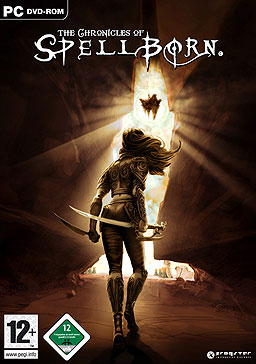
The Chronicles of Spellborn was a massively multiplayer online role-playing game (MMORPG) initially released on November 27, 2008, developed by Spellborn International and distributed by Frogster Interactive, Mindscape and Acclaim Games; set in a post-apocalyptic fantasy world. Spellborn used the Unreal Engine, featured a European Art approach and contained notable contributions from Jesper Kyd. In August 2010, the game was shut down. As of 2019, the game is still played on a proprietary private server that is operated by a former developer.

Nineteen full expansions for the MMORPG EverQuest II have been released, as well as three Adventure Packs.

Darkfall was a massively multiplayer online role-playing game (MMORPG) developed by Aventurine SA that combined real-time action and strategy in a fantasy setting. The game featured unrestricted PvP, full looting, a large, dynamic game world, and a player-skill dependent combat system free of the class and level systems that typify most MMORPGs. Darkfall had a 3D world environment and contained mild violence. The official Darkfall servers were closed on 15 November 2012.
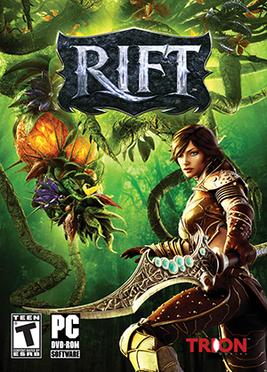
Rift is a fantasy free-to-play massively multiplayer online role-playing game developed by Trion Worlds. Rift takes place within the fantasy world of Telara. Two competing factions, composed of a selection of races and classes, battle each other and the enemies who emerge from dynamic "rifts". The game was released in March 2011. A port of the game, called Rift Mobile, was released for Android on January 25, 2012.

Trion Worlds was an American video game developer. It focused primarily on MMOs, particularly of the MMORPG and MMORTS genres. The company was founded in 2006 by Lars Buttler and Jon Van Caneghem, who had each previously worked for NCSoft and left in 2009 to join Electronic Arts.

Wizardry Online was a free-to-play MMORPG developed by Gamepot, Inc, based on the classic Wizardry computer games originally created by Sir-Tech. It was released in January 2013 before being discontinued in July 2014.

Revelation Online is a free-to-play massively multiplayer online role-playing game (MMORPG) developed by NetEase, under the title Revelation in China and Revelation Online in the rest of the world. It is published by My.com in Europe and North America, and received an open release worldwide on March 6, 2017. The game features classic MMORPG gameplay and is set in a world inspired by the books of the Chinese fantasy author Jiang Nan. Revelation Online receives regular update content updates, with the latest, Heaven and Earth, due for release in 2019.Finished on March 12, 2024. Its in-flight combat system and its numerous customization options effectively in gameplay are missed, having no equivalent, only pseudo alter egos like Aion: The Tower of Eternity. There were 3 months of prevention and free content before closure, surpassing the necessary duration to completely finish the game. This leaves little possibility for its re-release or for the tolerance of private servers.
